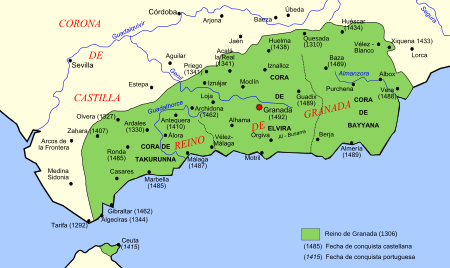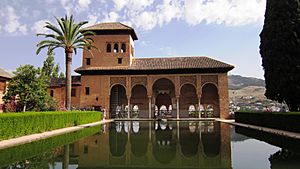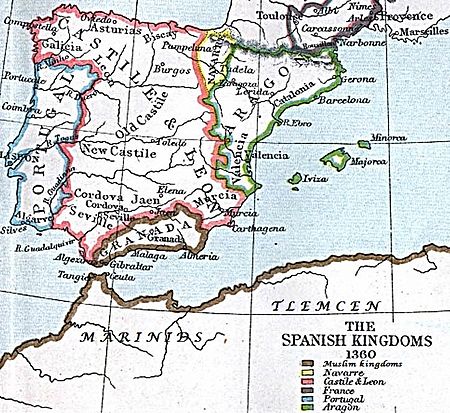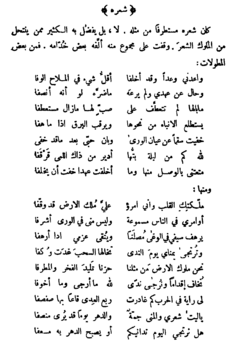Muhammad III of Granada facts for kids
Quick facts for kids Muhammad III |
|||||
|---|---|---|---|---|---|
| Sultan of Granada | |||||
| Reign | 8 April 1302 – 14 March 1309 (8 Shaban 701 – 1 Shawwal 708 AH) |
||||
| Predecessor | Muhammad II | ||||
| Successor | Nasr | ||||
| Born | 15 August 1257 Granada, Emirate of Granada |
||||
| Died | 21 January 1314 (aged 56) Granada, Emirate of Granada |
||||
| Burial | Sabika Hill, Alhambra, Granada | ||||
|
|||||
| House | Nasrid dynasty | ||||
| Father | Muhammad II | ||||
| Religion | Islam | ||||
Muhammad III (Arabic: محمد الثالث; born August 15, 1257 – died January 21, 1314) was a ruler of the Emirate of Granada. This was a Muslim kingdom in Al-Andalus (modern-day Spain) on the Iberian Peninsula. He ruled from April 8, 1302, to March 14, 1309. He was a member of the Nasrid dynasty, a powerful family that ruled Granada.
Muhammad III became the Sultan of Granada after his father, Muhammad II, passed away. Some rumors suggested that Muhammad III might have poisoned his father to take the throne, but this was never proven. He was known for being both well-educated and sometimes cruel. Later in his life, he started to lose his eyesight. This meant he couldn't do many government tasks and had to rely on his chief minister, Ibn al-Hakim al-Rundi.
Muhammad III inherited a war against the Christian kingdom of Castile. He continued his father's military success, capturing more land like Bedmar in 1303. The next year, he made a peace treaty with Castile. In this treaty, Granada's new lands were recognized. In return, Muhammad III promised loyalty to the Castilian King, Ferdinand IV, and agreed to pay him tribute (regular payments).
Muhammad III also wanted to control Ceuta, a city in North Africa. First, he encouraged the people of Ceuta to rebel against their rulers, the Marinids, in 1304. Then, two years later, he invaded and took over the city himself. This meant Granada controlled both sides of the Strait of Gibraltar, an important sea passage. This worried Granada's powerful neighbors: Castile, the Marinids, and Aragon. By the end of 1308, these three powers had formed an alliance against Granada.
As these powerful neighbors prepared for war, Muhammad III was removed from power in a sudden palace coup. His foreign policy, especially the control of Ceuta, was not popular with his nobles. Also, his chief minister, Ibn al-Hakim, who had become very powerful because of Muhammad's poor eyesight, was not trusted by many. Muhammad III was replaced by his half-brother, Nasr, on March 14, 1309. Muhammad was allowed to live in Almuñécar. However, after his supporters tried to bring him back to power, he was killed five years later in the Alhambra.
Muhammad III's reign was short, especially compared to his father and grandfather. He was later known as al-Makhlu ("the Deposed"). He ordered the building of the Great Mosque of the Alhambra (which was later destroyed) and the Partal Palace within the Alhambra. He also built a public bathhouse nearby, and the money from it helped pay for the mosque. He was known for his sense of humor and loved poetry and books. He even wrote his own poems, two of which can still be read today.
Contents
Granada's History and Neighbors

Al-Andalus was the Muslim part of the Iberian Peninsula. In the early 1200s, after a large empire broke up, it was divided into many small kingdoms called taifas. Muhammad III's grandfather, Muhammad I, started one of these kingdoms, which became the Emirate of Granada.
By the mid-1200s, Christian kingdoms in Iberia, especially Castile, began to expand rapidly. This period was called the reconquista, meaning "reconquest." Granada became the last independent Muslim state on the peninsula.
Granada managed to stay independent by using clever diplomacy and military tactics. It was surrounded by two larger neighbors: Christian Castile to the north and the Muslim Marinid state in Morocco. The Sultans of Granada would sometimes form alliances, go to war, or encourage these two powers to fight each other. This helped Granada avoid being controlled by either. Sometimes, Granada's Sultans would promise loyalty and pay tributes to the Kings of Castile. This was an important source of money for the Christian kings.
Early Life and Education
Muhammad ibn Muhammad was born on August 15, 1257, in Granada. His father was the future Muhammad II. His mother was his father's first cousin. They belonged to the Nasrid family.
Muhammad III was born when his grandfather, Muhammad I, was still ruling. Earlier that same year, his father was named the heir to the throne. Muhammad III had a sister named Fatima. His father also had a second wife, who was Christian, and they had a much younger half-brother named Nasr (born in 1287).
Their father, Muhammad II, was known as al-Faqih (the "legal scholar") because he was very learned. He encouraged his children to study. Muhammad III loved poetry, his sister Fatima studied the lives of Islamic scholars, and Nasr studied astronomy.
When Muhammad III could still see well, he loved to read late into the night. He was named heir (wali al-ahd) during his father's rule and was involved in government matters. As a young prince, he almost had his father's secretary, Ibn al-Hakim (who would later become Muhammad III's chief minister), executed. This was because of a rumor that the secretary wrote satirical poems criticizing the ruling family. Ibn al-Hakim hid until the prince's anger cooled down.
Muhammad III's Rule
Becoming Sultan
Before his death, Muhammad II had a successful military campaign against Castile. He took advantage of Castile fighting Aragon and the young age of the Castilian king, Ferdinand IV. Muhammad II defeated the Castilian army in 1295 and captured border towns like Quesada and Alcaudete. In 1301, Muhammad II made an agreement with Aragon to attack Castile together and recognized Granada's claim to Tarifa, an important port. This agreement was finalized in January 1302, but Muhammad II died before the attack happened.
Muhammad III became Sultan at about 45 years old when his father died on April 8, 1302. There were rumors that Muhammad III, perhaps eager to rule, poisoned his father. However, these rumors were never confirmed. An interesting story says that during his coronation ceremony, a poet recited: "For whom are the banners today unfurled? For whom do the troops 'neath their standards march?" Muhammad III jokingly replied, "For this fool you can see before you all."
Making Peace with Neighbors
At first, Muhammad III continued the war against Castile. He kept the alliance with Aragon and the Marinids. He also supported Alfonso de la Cerda, who wanted to be the King of Castile. Muhammad III sent his chief minister to the Marinid Sultan and even sent Granadan archers to help the Sultan in a siege. He also wrote to James II to confirm their friendship.
On the Castilian border, Granadan troops captured Bedmar and nearby castles soon after Muhammad III became Sultan. After this, Muhammad III began peace talks with Castile. In 1303, Castile offered to give Granada almost all its demands, including Bedmar, Alcaudete, and Quesada. However, Castile would keep Tarifa. In exchange, Muhammad III would agree to become King Ferdinand's vassal (a ruler who owes loyalty to a more powerful king) and pay parias (tribute). This treaty was signed in August 1303 and was meant to last three years. In 1304, Aragon also made peace with Castile, which meant peace for all three kingdoms.
This peace agreement gave Granada a strong position in the Strait of Gibraltar. However, it also caused problems. Many people in Granada were unhappy with the alliance with the Christian kingdoms. Muhammad III even dismissed 6,000 of his North African soldiers. The Marinid state was also upset because the alliance isolated them. Aragon was worried that strong ties between Castile and Granada would harm its trade through the Strait.
Taking Ceuta and Its Effects
With peace from the Christian powers, Granada tried to expand into Ceuta, a city on the North African side of the Strait of Gibraltar. Controlling the Strait was very important for Granada's foreign policy. In 1304, the people of Ceuta declared independence from the Marinids. Granadan agents had encouraged this rebellion.
In May 1306, Granada sent a fleet to capture Ceuta. They took control of the city and declared Muhammad III its ruler. Granadan forces also landed in Marinid ports like Ksar es-Seghir and Larache. At the same time, a Marinid prince rebelled and allied with Granada. The Marinid Sultan died in 1307, and his grandson became the new Sultan.
The new Marinid Sultan took back some ports from Granada. The rebel Marinid prince had to flee to Granada. The Sultan then demanded Ceuta back from Muhammad III and prepared to attack it. However, the Sultan died in 1308, and his brother became the new ruler. This new Sultan agreed to a truce, leaving Ceuta under Granada's control.
Controlling Ceuta, along with Gibraltar and Algeciras, gave Granada strong control over the Strait. But this worried the Marinids, Castile, and Aragon, who began to think about forming an alliance against Granada.
The Rise of the Chief Minister
During Muhammad III's rule, his chief minister, Abu Abdallah ibn al-Hakim al-Rundi, became very powerful. He eventually had more power than the Sultan himself. This happened partly because the Sultan was becoming blind or had very poor eyesight. This meant Muhammad III couldn't do many of his duties.
Ibn al-Hakim had started as a secretary in 1287. Muhammad III kept him in service and made him a co-chief minister. After the other chief minister died in 1303, Muhammad III made Ibn al-Hakim the sole chief minister. Because he controlled two important government positions, he was given the title dhu al-wizaratayn ("holder of the two chief minister positions"). He was the one who signed the 1303 treaty with Castile and visited Ceuta after its conquest, not the Sultan. As his power grew, poets at court started writing poems for him instead of the Sultan, and he lived a very luxurious life.
Alliance Against Granada
Despite Granada's efforts, Aragon continued to work against Granada. This led to a treaty on December 19, 1308, between Aragon and Castile. The Christian kingdoms agreed to attack Granada, not make separate peace deals, and divide Granada's lands between them. Aragon would get one-sixth of the kingdom, and Castile would get the rest. Aragon also made a deal with the Marinid Sultan to help him conquer Ceuta.
These three powers prepared for war against Granada. The two Christian kingdoms asked the Pope for a special permission for a crusade and money from the church. These were granted in March and April 1309. Granada noticed Aragon's naval preparations. Muhammad III asked the King of Aragon about his plans, but the king lied and said it was for conquering Sardinia. Meanwhile, Castilian forces had already attacked Granadan territory. The Nasrid governor of Almería responded by arresting Catalan merchants and taking their goods. The Granadan fleet also prepared for war.
Losing Power and Later Life
With Granada's three powerful neighbors ready to attack, Muhammad III became very unpopular at home. On March 14, 1309, a group of people removed Muhammad from power in a palace coup. His chief minister, Ibn al-Hakim, was killed. The coup involved a rival of the chief minister, a group of important Granadan nobles who preferred Muhammad's 21-year-old half-brother Nasr, and angry citizens of Granada.
The chief minister was seen as holding the real power, and his policies and fancy lifestyle made him the main target of the people's anger. The people of Granada looted the palaces of the Sultan and the chief minister. The chief minister was personally killed. Muhammad III was allowed to live but was forced to give up his throne to Nasr. He first lived just outside the capital, then was moved to Almuñécar on the coast.
In November 1310, when Nasr was very ill, some members of the royal council tried to bring Muhammad III back to power. They urgently brought the old and blind Muhammad III from Almuñécar to the court. However, Nasr recovered, and the attempt to restore Muhammad III failed. Muhammad III was then imprisoned in the Alhambra.
Rumors spread that he had been killed. These rumors helped cause a rebellion led by Abu Said Faraj and his son Ismail. This rebellion eventually led to Nasr being removed from power, and Ismail became Sultan in 1314. While Nasr was dealing with Ismail's rebellion, another rebellion happened in Granada in late 1313 or early 1314 to bring Muhammad III back. This likely caused Nasr to murder his brother. Muhammad III was murdered on January 21, 1314. He was buried on the Sabika Hill of the Alhambra, next to his grandfather Muhammad I.
Personality and Achievements
A historian named Ibn al-Khatib, who wrote in the mid-1300s, said that Muhammad III had a mix of good and bad traits. Ibn al-Khatib shared a story about Muhammad III's cruelty: at the start of his rule, he imprisoned his father's soldiers and refused to feed them. When a guard gave them food, Muhammad executed him. There was also the unconfirmed rumor that he murdered his father.
Despite this cruelty, Muhammad III was also known as a cultured man. Like many rulers in Al-Andalus, he loved poetry. He even wrote his own poems. One of his poems is:
She made me a promise and broke it;
how little loyalty women have!
She reneged from her pledge and did not keep it;
she wouldn't have broken it if it had been fair!
How come she shows no sympathy
for an ardent lover who never stops inviting her affection,
who seeks all the news about her
and contemplates the lightning when it flashes?
I hid my ailment from the eyes of men,
but my love became clear after having been hidden.
Oh, how many nights I spent drinking
the wine of those lovely lips!
[Now] I've been denied her company,
without breaking a pledge, which I fear she has broken.
He was also known for his sense of humor, like the joke he made during his coronation ceremony.
Governance and Buildings

Because of his poor eyesight, Muhammad III was often absent from government duties. This allowed his chief minister, Ibn al-Hakim, to gain absolute power. Other important officials during his reign included Abu Sultan Aziz ibn al-Mun'im al-Dani (co-chief minister), Hammu ibn Abd al-Haqq (Chief of the Volunteers of the Faith), and Uthman ibn Abi al-Ula (Commander of the Volunteers). His brother-in-law, Abu Said Faraj, was the governor of Málaga.
Muhammad III ordered the building of the great mosque (al-masjid al-a'ẓam) in the Alhambra, which was the royal palace and fortress complex of the Nasrids. Muslim writers described how beautiful this mosque was. It no longer exists today because Philip II replaced it with a church in 1576. Muhammad III decorated the mosque with columns and lamps. He also set up a permanent income for the mosque from the rents of a public bathhouse he built nearby. He is also linked to other buildings in the Alhambra, including the Partal Palace.
Unlike Muhammad I and II, who ruled for a long time, Muhammad III was removed from power after only seven years. Historians gave him the nickname al-Makhlu' ("the deposed"). This name was used only for him, even though many later sultans were also deposed.
His successor, his half-brother Nasr, inherited the war against the alliance of the Marinids, Castile, and Aragon. Aragon was defeated at Almeria, and Castile was pushed back at Algeciras. However, Nasr was less successful in other areas. To get peace, he had to give Ceuta back to the Marinids and Quesada and Bedmar back to Castile. This meant losing most of the land Muhammad III had gained. He also had to give Algeciras to the Marinids and lost Gibraltar to Castile. Nasr himself was later removed from power by his nephew Ismail I in 1314.
The downfall of Muhammad III and Nasr, and their deaths without a direct heir, meant the end of the male line of Muhammad I, who founded the dynasty. Ismail I and the sultans who came after him were descended from Fatima, the daughter of Muhammad II, and her husband. The Nasrid Emirate of Granada remained the only Muslim state in Spain for almost two more centuries until it was conquered by the Catholic Monarchs in 1492.
Images for kids
-
Ferdinand IV of Castile, Muhammad's contemporary, and at different times his enemy, ally, and overlord
See also
 In Spanish: Muhammad III de Granada para niños
In Spanish: Muhammad III de Granada para niños
 | John T. Biggers |
 | Thomas Blackshear |
 | Mark Bradford |
 | Beverly Buchanan |




